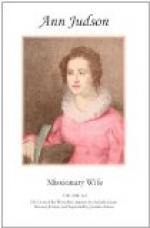The next day, Moung Yo, a favorite officer of the viceroy, came to take them to the imperial palace. He first introduced them to the private minister of state, who met them very pleasantly, received their presents, and a petition they had prepared to the emperor, which latter he was examining when some one announced that the ‘golden foot’ was about to advance; when the minister hastily rose up, put on his state-robes, and prepared to present them to the emperor. They were conducted through various splendor and parade, up a flight of steps into a magnificent hall. Mr. Judson says “The scene to which we were now introduced, really surpassed our expectation. The spacious extent of the hall, the number and magnitude of the pillars, the height of the dome, the whole completely covered with gold, presented a most grand and imposing spectacle. Very few were present, and those evidently great officers of state. Our situation prevented us from seeing the further avenue of the hall, but the end where we sat opened into the parade which the emperor was about to inspect.
“We remained about five minutes, when every one put himself into the most respectful attitude, and Moung Yo whispered that his majesty had entered. We looked through the hall as far as the pillars would allow, and presently caught sight of this modern Ahasuerus. He came forward, unattended—in solitary grandeur—exhibiting the proud gait and majesty of an eastern monarch. His dress was rich but not distinctive, and he carried in his hand the gold-sheathed sword, which seems to have taken the place of the sceptre of ancient times. But it was his high aspect and commanding eye, that chiefly rivetted our attention. He strided on. Every head excepting ours, was now in the dust. We remained kneeling, our hands folded, our eyes fixed on the Monarch. When he drew near, we caught his attention. He stopped, partly turned towards us—’Who are these?’ ‘The teachers, great King,’ I replied. ’What, you speak Burman?—the priests that I heard of last night? When did you arrive? Are you teachers of religion? Are you married? Why do you dress so?’ These and other similar questions we answered; when he appeared to be pleased with us, and sat down on an elevated seat—his hand resting on the hilt of his sword, and his eyes intently fixed on us.”
Moung Zah now read their petition, which set forth that they were teachers of the religion of their country, and begged the royal permission to teach the same in his dominions; and also prayed that no Burman might be subjected to molestation from government for listening to or embracing that religion; and the emperor after hearing it, took it himself, read it through and handed it back without saying a word. In the meantime Mr. Judson had given Moung Zah an abridged copy of the tract called a “Summary of Christian Doctrine,” which had been got up in the richest style and dress possible. The emperor took the tract “Our hearts,” says Mr. J., “now rose to God




